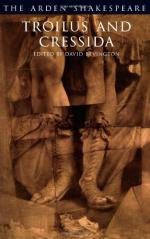|
This section contains 9,147 words (approx. 31 pages at 300 words per page) |

|
SOURCE: "The Politics of Desire in Troilus and Cressida," in Shakespeare and the Question of Theory, edited by Patricia Parker and Geoffrey Hartman, Methuen, 1985, pp. 188-209.
In the following essay, Girard examines the presence of mimetic desire in Troilus and Cressida and states that the purpose of the play is "to show that lechery and war are one. "
In Act IV, Scene ii, Troilus and Cressida are getting up after their first and only night together. More than ever, Cressida speaks the language of love. She has not changed, or, if she has, the change goes in the direction of more love, not less.
Troilus has definitely changed, but in the other direction. He no longer speaks like a man in love:
Troilus: Dear, trouble not yourself; the morn is cold.
Cressida: Then, sweet my lord, I'll call mine uncle down;
He shall unbolt the gates.
Troilus: Trouble...
|
This section contains 9,147 words (approx. 31 pages at 300 words per page) |

|


